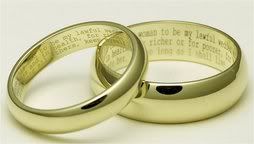
So my ex is getting married this weekend. I only know this via the grapevine from my ex-ex-ex, or like, my ex to the fifth power. One of those girlfriends from so long ago you forget you actually once knew what they looked like naked, or cared, and now they're more like your sister, only less fucked up. So you care a lot more, or at least, a lot more comfortably. She calls to tell me my ex is getting married, which she knows NOT because she was invited, though she should have been, since she helped ex leave academia and get into publishing, where ex is now reportedly making a mint. Meanwhile, I declare bankruptcy, but I digress.
So ex to the fifth knows because ex has invited mutual friends of hers and ex(5), because ex has a habit of stealing friends, though eventually they figure things out. So ex(5)'s friends, stolen by ex briefly, were invited. But not ex (5), because of the perception of loyalty to me. Do I have to tell you we are in a dyke drama here, or would you know just from reading this? Immediately know? There are condos involved in Provincetown, just to let you in on how really gay this soap is. So ex (5) tells me ex is getting married, but not, for some reason, in Massachusetts, where ex actually now lives and works, and where it makes a smidge of sense, but in Maine, where ex's woman lives. Why, Lord, why?
Let's consider this closely. When you say the words "gay wedding," and mean them to describe an act you are about to perform upon yourself and all those unfortunate enough to be sucked into your orbit, you are already 95% sure of looking ridiculous. Straight people think we're just pathetic wannabees, most states don't validate the sentimental ceremony with legal status, and worse, most weddings are tacky affairs pulled together on a shoestring budget masquerading as "classy" minimalism. Straight weddings are like this, right? Cash bars, pale blue bridesmaids' dresses, grooms hell-bent on a "let's relive the prom" tuxedo, brides in white getups, looking like JonBenet Ramsay in a computer-aged photo. Gay weddings are even more sincere, even shakier in their dignity, desperate to shore up legitimacy under assault from all sides. And lesbians, mostly, are poor. Or at least, not so rich.
I'm just saying that the chances of lameness are extraordinary.
So the ex isn't getting married in Mass. Why? And they've decided to have a Quaker wedding, even though they were both raised Catholic. Maybe BECAUSE they were both raised Catholic. But the clincher is that they are supposedly going to all sit in a circle and read the Massachusetts high court decision out loud. While choosing not to get married in Massachusetts.
I'm not sure why I care. Maybe I just suspect the ex is getting railroaded. After all, the person I knew shared a suspicion of marriage but an appreciation of the open-bar, huge banquet blowout, complete with swing band and endless martinis. Maybe she's capitulated to someone else's tastes. Or maybe, worse, she's changed. She's gotten more sincere, less ironic, more idealistic, less bitter. And maybe that's the hard part. Maybe I still want to protect her from embarrassment, from people smirking who in reality have no right even to polish her shoes, much less pass judgement. Maybe I'm jealous. We were together 11 years through graduate school and the job market and cross-country relationships, but we never got a wedding, or took one for ourselves. My family seemed to take eight years to accept us as a couple, and by the time we broke up, family disapproval on both sides just seemed too hard on top of everything else. Sure we threw many Christmases, but our relationship meant no grandchildren in my mother's eyes. Sure we babysat her mother through a lonely widowhood, until she met another man and married again, but then we became inconvenient and illegible, a difficulty for the new husband. When we split up, it seemed to me that her mother, who had always been very kind to me, was actually relieved, thinking maybe Mary would marry late in life, as she had. That hurt.
Well Mary is getting married at 40, though not to a man. Somehow she has stayed out, stayed alive, found love, been successful. She is probably quite happy. She will try to have a meaningful ceremony because her life matters, and whether or not her family gets it, she knows she matters. So here's to you, faraway ex. Good for you, for standing up for yourself enough to look ridiculous, or to have dignity, which are sometimes the same thing. Sit in a circle of your friends, think about a place for love in this world, eat good food, and play for hours through one of summer's long golden days. This weekend, which is gay pride in many cities around the country, you are going on with your life, and your dreams, and your vision of what love and family mean across the miles, and political divides, and bitter religious disputes. Have sex. Go for a walk. Make a big dinner. Get tan. Drink a whole bottle of wine--or better yet, champagne. Dance. Be proud. Live long, as Tuvok says on Voyager. Live long, and prosper.




